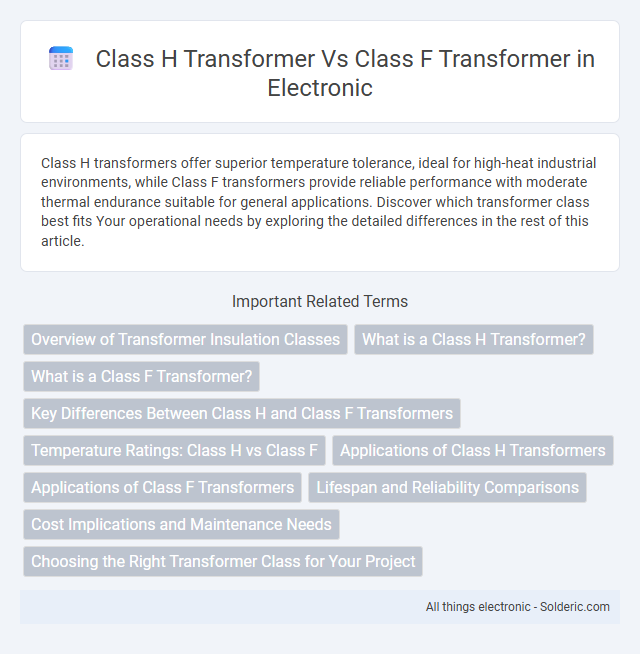Class H transformers offer superior temperature tolerance, ideal for high-heat industrial environments, while Class F transformers provide reliable performance with moderate thermal endurance suitable for general applications. Discover which transformer class best fits Your operational needs by exploring the detailed differences in the rest of this article.
Comparison Table
| Feature | Class H Transformer | Class F Transformer |
|---|---|---|
| Insulation Temperature Rating | 180degC | 155degC |
| Maximum Operating Temperature | 180degC | 155degC |
| Lifespan | Longer due to higher thermal tolerance | Standard lifespan |
| Thermal Class Standard | IEC 60085, Class H | IEC 60085, Class F |
| Cost | Higher due to advanced insulation materials | More cost-effective |
| Application | High-temperature environments, heavy-duty use | General industrial and commercial use |
| Efficiency | Better thermal performance, potentially higher efficiency | Standard efficiency levels |
| Coolant Compatibility | Compatible with high-temp coolants | Compatible with standard coolants |
Overview of Transformer Insulation Classes
Class H transformers feature insulation rated for continuous operation at 180degC, providing enhanced thermal endurance for high-temperature environments. In comparison, Class F transformers have insulation designed for a maximum temperature of 155degC, balancing performance and cost for moderate thermal conditions. The higher temperature tolerance of Class H insulation allows transformers to handle increased load and ambient temperature variations without degradation.
What is a Class H Transformer?
A Class H transformer is designed with insulation materials rated for temperatures up to 180degC, allowing it to operate safely under higher thermal conditions compared to Class F transformers, which are rated for 155degC. This higher temperature tolerance enhances the Class H transformer's longevity and efficiency in demanding industrial applications. Class H transformers are ideal for environments where elevated temperatures are common, reducing the risk of insulation degradation and increasing operational reliability.
What is a Class F Transformer?
A Class F transformer is designed with insulating materials capable of withstanding temperatures up to 155degC, providing enhanced thermal performance compared to Class H transformers rated for 180degC. It uses a mix of paper, polyester, and fiberglass insulation, making it suitable for applications where moderate heat resistance and longer lifespan are required. Class F transformers balance efficiency and durability, commonly used in industrial equipment, electric motors, and power distribution systems.
Key Differences Between Class H and Class F Transformers
Class H transformers have insulation systems rated for 180degC, while Class F transformers use insulation rated for 155degC, making Class H more suitable for higher temperature environments. Class H transformers typically offer enhanced thermal endurance and longer lifespan compared to Class F, due to superior insulation materials and construction methods. Your choice depends on operational temperature requirements and desired transformer longevity, with Class H providing better performance under more demanding heat conditions.
Temperature Ratings: Class H vs Class F
Class H transformers are designed to operate at a maximum temperature of 180degC, whereas Class F transformers have a maximum temperature rating of 155degC. This higher temperature tolerance in Class H transformers allows for increased thermal endurance and potentially longer service life under high-load conditions. Your choice between Class H and Class F transformers should consider the operational temperature environment to ensure reliable performance and insulation longevity.
Applications of Class H Transformers
Class H transformers provide superior thermal performance and are ideal for industrial applications requiring higher temperature ratings, such as heavy machinery, power plants, and steel mills. Their enhanced insulation system supports continuous operation at temperatures up to 180degC, making them suitable for environments with elevated thermal stress. Class H transformers are preferred in demanding settings where Class F transformers, rated for up to 155degC, may not ensure optimal reliability and lifespan.
Applications of Class F Transformers
Class F transformers are engineered for high-temperature environments with insulation ratings up to 155degC, making them ideal for industrial machinery, power generation, and heavy-duty electrical equipment. Their robust thermal stability ensures superior performance and longevity in applications requiring continuous operation under elevated thermal stress. Your systems benefit from Class F transformers when reliability in extreme conditions is critical compared to Class H transformers, which support even higher temperature limits but are less commonly required in standard industrial settings.
Lifespan and Reliability Comparisons
Class H transformers offer higher thermal endurance with insulation rated up to 180degC, extending lifespan significantly compared to Class F transformers, which have insulation rated at 155degC. Your choice of a Class H transformer ensures improved reliability under demanding operating conditions due to its superior heat resistance, reducing the risk of thermal degradation and premature failure. Class F transformers are suitable for less stressful environments but may require more frequent maintenance to maintain performance over time.
Cost Implications and Maintenance Needs
Class H transformers, designed for higher temperature operation up to 180degC, generally have higher initial costs due to advanced insulation materials compared to Class F transformers rated for 155degC. The enhanced thermal performance reduces the frequency of maintenance and extends the lifespan, potentially lowering long-term operational costs. Your choice depends on balancing upfront investment against expected durability and maintenance schedules.
Choosing the Right Transformer Class for Your Project
Class H transformers offer higher thermal limits up to 180degC, making them suitable for projects requiring enhanced heat resistance and longevity, while Class F transformers are rated for 155degC, providing a cost-effective solution with good thermal endurance. Your choice depends on the operating environment and expected load conditions; Class H is ideal for high-temperature or demanding industrial applications, whereas Class F fits well in less severe settings. Selecting the right transformer class ensures optimal performance, reliability, and lifespan tailored to your project's specific thermal and mechanical requirements.
class H transformer vs class F transformer Infographic

 solderic.com
solderic.com